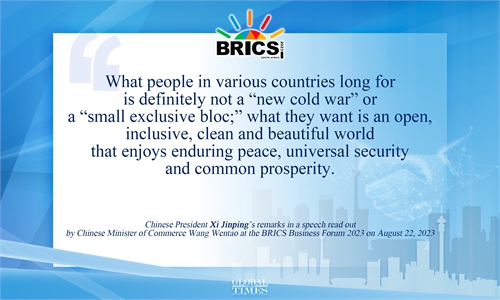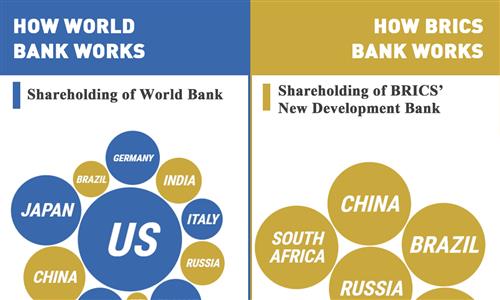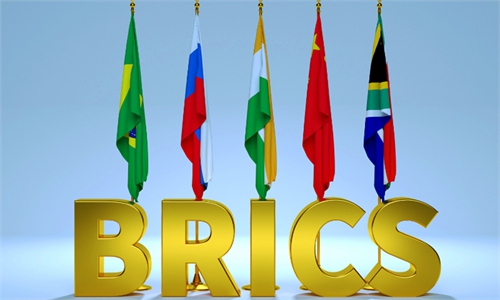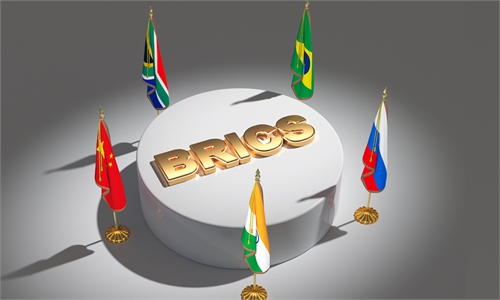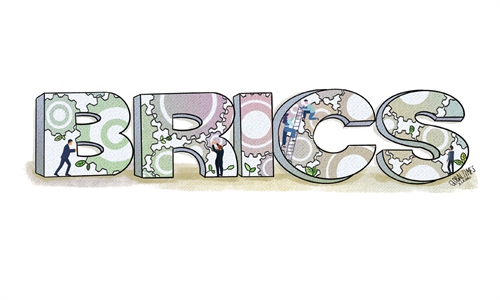Xi calls for speedy expansion of BRICS; strategic partnership of the group to forge stronger, deeper solidarity
BRICS of great significance to global governance, in contrast with West-led hegemony and bloc-confrontation: experts
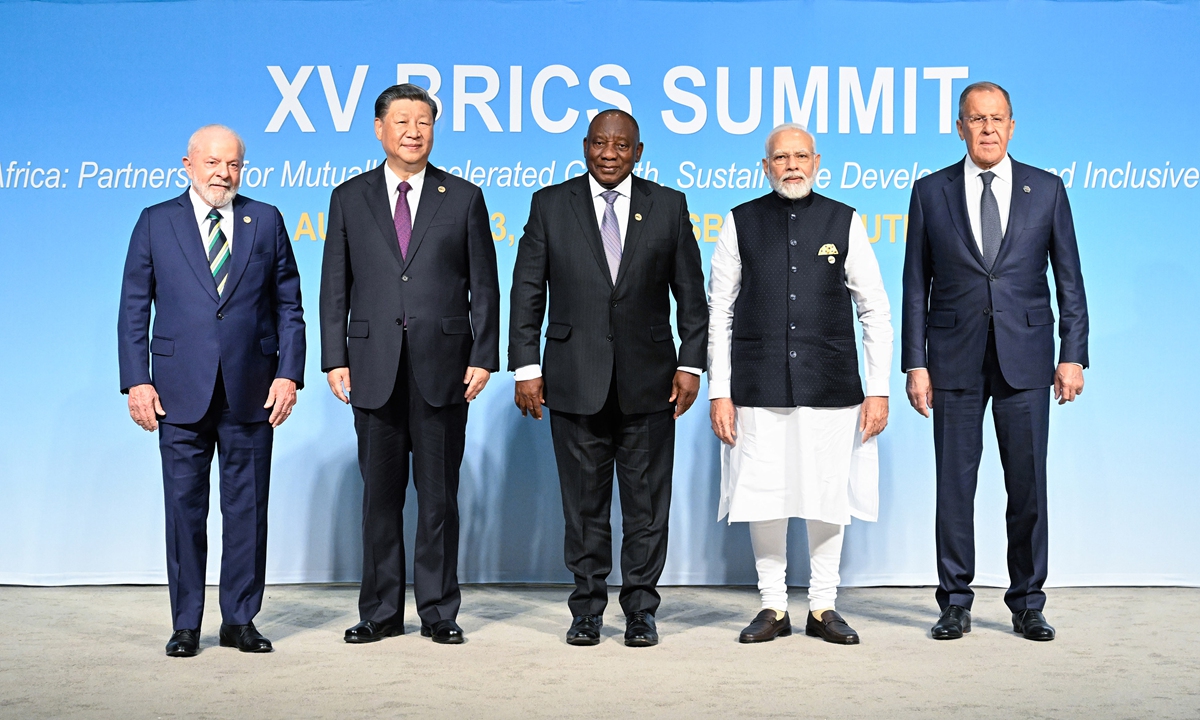
From left: Brazilian President Luiz Inacio Lula da Silva, Chinese President Xi Jinping, South African President Cyril Ramaphosa, Indian Prime Minister Narendra Modi and Russian Foreign Minister Sergey Lavrov (representing President Vladimir Putin) have a group photo at the 15th BRICS Summit held in Johannesburg, South Africa on August 23, 2023. Photo: Xinhua
Xi said when addressing the 15th BRICS Summit on Wednesday that development is an inalienable right of all countries, not a privilege of a few countries. BRICS countries should be peers on the road of development and revitalization, oppose acts of "decoupling" and disrupting industrial and supply chains, as well as economic coercion, and focus on practical cooperation in such areas as digital economy, green development, supply chain, among others, Xi said.
He also called for the speedy expansion of BRICS as well as efforts to promote more just and reasonable global governance.
"It is unacceptable to package one's own rules and regulations as international norm," Xi said, noting that international norms should be written and upheld by all countries based on the purposes and principles of the UN Charter, rather than dictated by those with the strongest muscles and loudest voice.
Xi, Brazilian President Luiz Inácio Lula da Silva, Indian Prime Minister Narendra Modi and South African President Cyril Ramaphosa began talks over dinner at a luxury estate in suburban Johannesburg on Tuesday night, ahead of the summit's main day of discussions on Wednesday, the AP reported. Foreign Minister Sergey Lavrov represented Russia in person, while Russian President Vladimir Putin participated in the dinner discussions virtually.
The leaders weighed rules for admitting new members to BRICS on Wednesday, as more than 40 countries have expressed interest in joining, and of them, nearly two dozen have formally asked to be admitted, Reuters said. Also, the leaders will discuss reducing the use of dollars for trade at the gathering on Wednesday, some media reported.
When the leaders kicked off this year's BRICS summit with the Business Forum on Tuesday, Wang Wentao, Chinese Commerce Minister, read out a speech from Xi, which underscored the importance of inclusive development, universal security, cultural exchange, and the collective rise of emerging economies and developing countries for a better world.
Xi expressed China's willingness to deepen solidarity and cooperation with other emerging markets and developing countries to make the international order more just and equitable.
"Emerging countries are becoming more and more relevant in the international arena. This summit will very much contribute to the shaping of a new global economic and political order. It will help change the current situation when it comes to international relations," he said.
Chinese and foreign observers believe that the BRICS bloc is of great significance to global governance today. Whether in global traditional security governance or global non-traditional security governance, BRICS countries have put forward their own series of propositions and voices that are conducive to a fair, effective and balanced global order, injecting positive energy to the world.
Some Western countries have been closely watching this year's BRICS summit, taking the potential expansion of the BRICS grouping as "a threat" or Beijing's attempt to turn BRICS into an anti-G7 group to counter the West. Some observers said such misunderstanding reflects their ill-intentioned motives to turn the multilateral cooperation mechanism into one of clique-driven confrontation and geopolitical rivalry.
China's role
Hegemonism is not in China's DNA, nor does China have any motivation to engage in major-power competition. China stands firmly on the right side of history and believes that a just cause should be pursued for the common good, Xi stressed.
Our world today has become a community with a shared future in which we all share a huge stake in survival, Xi said, noting that what people in various countries long for is "definitely not a new Cold War or a small exclusive bloc; what they want is an open, inclusive, clean and beautiful world that enjoys enduring peace, universal security and common prosperity."
China has been the crucial BRICS member in recent years. Not only for the sheer size of its economy and scale of its population but as a result of its concerted effort to raise its profile and role in the global order, Paulo Wrobel, a researcher at the Brazilian think tank BRICS Policy Center, told the Global Times.
"The greater interest all over the world about the BRICS is due mainly because China is a member. Even though India is also making great efforts to raise its international profile, it is China which is leading BRICS," Wrobel said.
The BRICS countries are expected to forge a stronger BRICS strategic partnership, expand the "BRICS Plus" model, actively advance membership expansion and deepen solidarity and cooperation with other emerging markets and developing countries.
"I think this expansion of BRICS has the advantage of expanding a group that represents more than ever a balance to the traditional Western powers," Ana Garcia, director of the BRICS Policy Center, told the Global Times.
The BRICS international relations are balancing powers to the main power, the US, which is now in decline. "Every time we will expand this group, you are balancing more into the direction of a multipolar world," Garcia said. "And that is the greatest advantage of expanding such a group as the BRICS."
In contrast with West hegemony
This trend toward expansion will form a strong shockwave to the Western-led international system and rule of law driven by hegemony and bloc confrontation, some experts said.
"Expanding BRICS is not for nothing. So many countries are certainly interested in the inclusiveness and openness of BRICS," Wang Youming, director of the Institute of Developing Countries at the China Institute of International Studies in Beijing, told the Global Times.
Compared to the camp-driven and centralized mechanism in the West, which is closed and exclusive, BRICS has displayed openness and inclusivity since the beginning. Especially since the division of the international power system is seriously unbalanced and is not in line with the size of the economies of developing and emerging countries, more countries are seeking to gain equivalent influence with the size of their economies, Wang said.
Clearly, Western countries have taken notice of the potential expansion of the BRICS organization and perceive it as a threat. Even nations that were staunch allies of the US until recently are now seeking to disengage from relationships built on dependency and imposition, including the use of force, former director of International Relations for the Venezuelan presidency and Venezuelan Ambassador to Nicaragua, Sergio Rodriguez Gelfenstein told the Global Times.
"The world no longer operates under the logic of the Cold War era; international relations no longer adhere to shared ideological thinking but are guided by national interests. Each country will undergo its own process to determine what aligns with its best interests and which countries are its friends and partners," Gelfenstein said.

